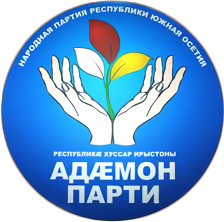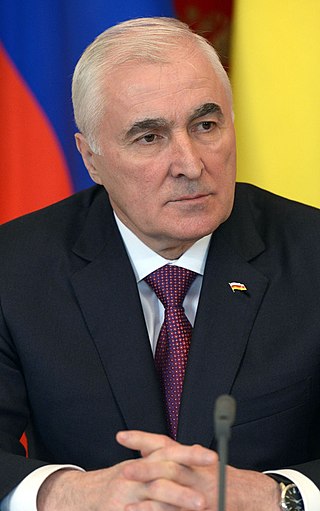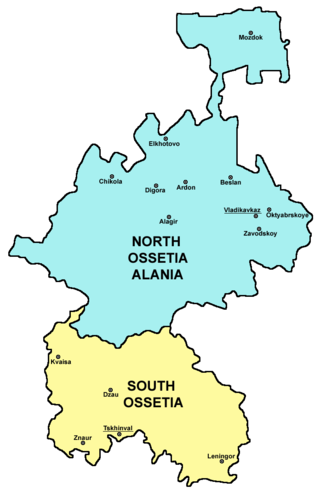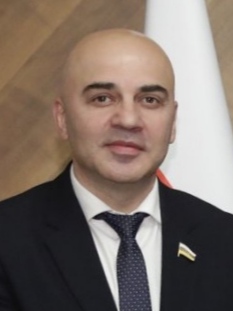Related Research Articles

The Communist Party of South Ossetia is a communist party in South Ossetia. The party was founded in 1993. As of 2004, the party claimed a membership of 1,500. The party seeks recognition of the Republic of South Ossetia, which is internationally recognized by most countries as a part of Georgia.

The People's Party of South Ossetia is a social liberal political party in South Ossetia, a partially recognized Caucasian republic, considered by most countries to be a part of Georgia. The party is known for being staunch supporters of former president Eduard Kokoity.

Leonid Kharitonovich Tibilov is a South Ossetian politician who served as the third president of South Ossetia from 2012 to 2017 after winning the 2012 South Ossetian presidential election.

Presidential elections were held in South Ossetia on 9 April 2017 alongside a referendum on changing the official name of the state to "Republic of South Ossetia–the State of Alania", or "South Ossetia–Alania" for short. Incumbent President Leonid Tibilov ran for a second and final term in office, but was defeated by Anatoly Bibilov of the United Ossetia party.

South Ossetia is a partially recognized and Russian-occupied separatist state internationally recognized as part of Georgia. It is mainly inhabited by Ossetians, an ethnic group also dominant in North Ossetia, which is part of Russia. South Ossetia separated itself from Georgia following the 1991–1992 South Ossetia War with the help of Russia, remaining ever since as a state closely allied with this country.

Alan Eduardovich Gagloev, also transliterated as Gagloyev, is a South Ossetian politician and former intelligence officer, who is the fifth and current president of South Ossetia since 2022. He also served as chairman of the Nykhaz party from 2020 to 2023.

Nykhaz is a political party in South Ossetia founded in 2013 by supporters of Independent president Leonid Tibilov. Its members and supporters are referred to as Nykhasovites in local media.

David Georgievich Sanakoev is a Ossetian separatist, indicted war criminal, politician, diplomat, and international fugitive, who served as Minister of Foreign Affairs of South Ossetia from 2012 to 2015, during the presidency of Leonid Tibilov.

The Unity of the People is a nationalist political party in South Ossetia, a partially recognized Caucasian republic, considered by most countries to be a part of Georgia. The party is led by Vladimir Kelekhsaev.

Vladimir Kelekhsaev is a South Ossetian politician. He has served as the chairman of the political party Unity of the People since its creation. Although not Russophobic, he, and Unity of the People, are Russoskeptic, believing Russian interest in South Ossetia as simply a means to control the small de facto independent republic. He promotes a policy of economic independence and pragmatic foreign policy.
Vyacheslav Gobozov is a South Ossetian politician who has been the Chairman of the Fatherland Socialist Party since its inception for the 2009 South Ossetian parliamentary election. He is one of the leading figures in the South Ossetian anti-Russian opposition. However, he is also a staunch Ossetian nationalist and supports the Republic's independence and maintains a pragmatic approach to when and where to oppose and accept Russian support.
Georgiy Kabisov is an Ossetian politician from the partially recognized Caucasus Republic of South Ossetia.
Iron is the name of two political parties that existed in different points in time in the disputed state of South Ossetia, which the international community recognizes as part of Georgia. The first, from 2010, was founded by South Ossetian dissidents.
Timur Tskhovrebov is a journalist, politician, and civil rights activist from the disputed state of South Ossetia, which the international community recognizes as part of Georgia. Known for being a staunch member of the opposition, Tskhovrebov campaigns against the South Ossetian government and the Russian presence in the country, which he argues has subverted the sovereignty of the Ossetian people.

Parliamentary elections were held in South Ossetia on 9 June 2024 to determine the composition of the South Ossetian Parliament, the legislature of the partially recognized Caucasian Republic of South Ossetia, which most of the United Nations recognizes as part of Georgia. In the 2022 presidential elections South Ossetia's opposition came to power for the first time since 2012, however, the government has been plagued by scandals.

Alan Alborov is an Ossetian politician from partially recognized South Ossetia, incumbent speaker of the Parliament of South Ossetia since September 2022. Alborov has served as the founding chairman of the Nykhaz political party, as well as the mayor of the capital city of Tskhinvali.
Garry Muldarov is a politician from the small, partially recognized, South Caucasian Republic of South Ossetia, serving as a member of parliament since 2019 as a member of the pro-Russian establishment United Ossetia, however, would leave the party in 2021 to become a political independent.
Amiran Dyakonov is an Ossetian politician from the partially recognized Caucasian Republic of South Ossetia, which most of the UN recognizes as part of Georgia, occupied by Russia. Dyakonov is a veteran legislator for the People's Party, previously being a member of the Unity Party.
Ossetia – Liberty Square was a political party in the from the partially recognized Caucasian Republic of South Ossetia, which most of the UN recognizes as part of Georgia, occupied by Russia. The party was established by longtime opposition figure, Alla Dzhioyeva, when her victory in the 2011 presidential election was annulled.

Iron, officially, the Republican Socialist Party "Iron" is a political party in the small Caucasian republic of South Ossetia, formed after the release of Georgiy Kabisov from prison. Kabisov, a vocal pro-Russian politician who was arrested on the charge of running an espionage ring to gather blackmail on members of the South Ossetian parliament, announced that he was going to be creating a political party named Iron, in reference to an earlier 2010 party of the same name, which in turn is a reference to the Iron dialect of Ossetian, as a new South Ossetian opposition party.
References
- ↑ "Tensions Rise In Georgia's Breakaway Regions". Eurasianet . Retrieved 8 March 2023.
- 1 2 "Explainer: Elections in S.Ossetia". Civil Georgia . Retrieved 8 March 2023.
- ↑ "Ex-presidential candidate sets up new party in South Ossetia". TASS . Retrieved 8 March 2023.
- ↑ "Freedom in the World 2015 - South Ossetia". www.refworld.org. Freedom House . Retrieved 8 March 2023.
- 1 2 Tarkhanova, Zhanna. "South Ossetia opposition unites around new leader, former KGB officer". jam-news.net. Retrieved 8 March 2023.
- ↑ "Political parties in South Ossetia are for maximum integration with Russia". State Information Agency . Retrieved 8 March 2023.
- ↑ Fuller, Liz. "'Integration' With Russia Rives South Ossetia's Political Scene". Radio Free Europe/Radio Liberty . Retrieved 8 March 2023.
- ↑ Liz, Fuller. "Is South Ossetia Heading For Political Crisis?". Radio Free Europe/Radio Liberty . Retrieved 8 March 2023.
- ↑ "Ruling party loses majority in South Ossetian parliament". OC Media . Retrieved 8 March 2023.
- ↑ "South Ossetia". Radio Free Europe/Radio Liberty . Retrieved 8 March 2023.
- ↑ Tarkhanova, Zhanna. "South Ossetia elects new parliament on June 9 – who's running, what to know". jam-news.net. Retrieved 8 March 2023.